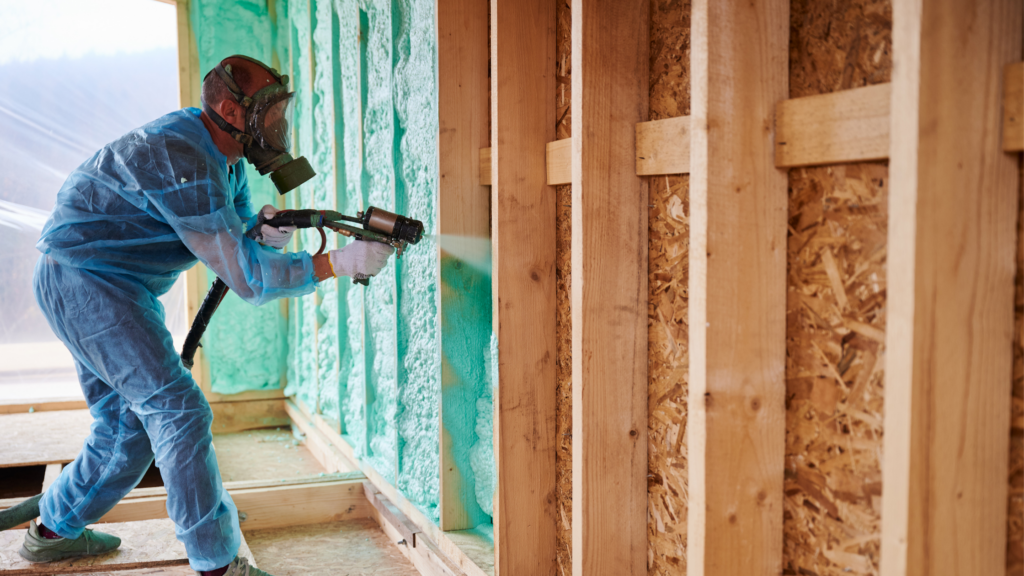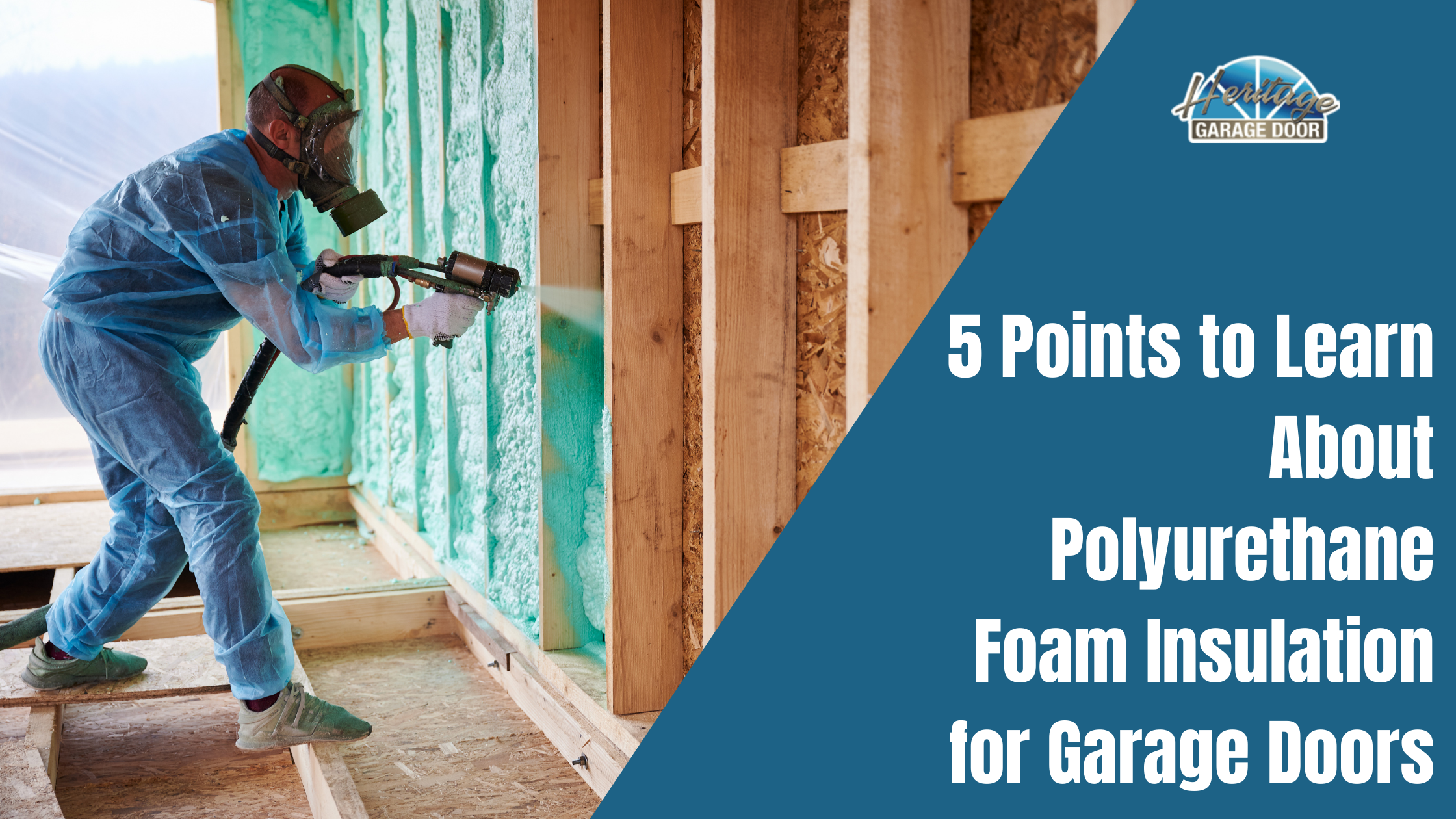
5 Key Facts About Polyurethane Foam Insulation for Garage Doors
Your garage door is a vital component of your home, influencing not just security but also energy efficiency and comfort. Polyurethane foam insulation is one of the best ways to enhance its performance. Known for its versatility and effectiveness, polyurethane foam is a premium material that provides a host of benefits for both residential and commercial garage doors. Let’s dive into five essential points about this innovative insulation method.
1. Superior Thermal Insulation

Polyurethane foam insulation is renowned for its high R-value, which indicates superior thermal resistance. This property makes it highly effective in reducing heat transfer through your garage door, maintaining a more consistent indoor temperature. Homes in areas with extreme temperatures—hot or cold—benefit significantly from this insulation type.
Why It Matters:
- It keeps your garage warmer in the winter and cooler in the summer.
- Prevents temperature fluctuations in attached garages, which can affect energy efficiency in adjoining rooms.
- Reduces strain on your HVAC system, leading to lower energy bills.
2. Enhanced Garage Door Durability
Unlike other insulation materials, polyurethane foam not only insulates but also reinforces the structure of your garage door. It is applied as a liquid that expands and hardens, creating a rigid core within the door panels. This added strength protects the door from:
- Dents and impacts, such as from vehicles, tools, or sports equipment.
- Damage caused by harsh weather, including wind and hail.
The structural support provided by polyurethane foam insulation makes it a smart choice for heavy-use garage doors in both residential and industrial settings.
3. Improved Energy Efficiency and Cost Savings
If energy efficiency is your priority, polyurethane foam insulation should be at the top of your list. By creating a highly effective thermal barrier, it reduces energy consumption, resulting in noticeable savings on heating and cooling costs.
Key Benefits:
- Helps maintain the efficiency of HVAC systems in homes with attached garages.
- Lowers energy bills, especially for garages that are frequently used or serve as workshops, gyms, or offices.
- Reduces your home’s carbon footprint, making it an environmentally friendly choice.
Over time, the savings on energy costs often offset the initial investment in polyurethane foam insulation.
4. Noise Reduction for a Quieter Garage
Polyurethane foam insulation isn’t just about temperature control; it also provides excellent soundproofing properties. The dense foam absorbs vibrations and sound waves, significantly reducing noise from outside and within the garage.
Ideal Scenarios for Noise Reduction:
- Garages located near living areas or bedrooms.
- Homes where the garage serves as a hobby space, music studio, or home office.
- Areas with frequent traffic noise or noisy garage door mechanisms.
This insulation ensures a quieter, more peaceful home environment, benefiting both you and your neighbors.
5. Moisture and Weather Resistance
One of the standout features of polyurethane foam insulation is its resistance to moisture and weather-related damage. Its closed-cell structure acts as an effective barrier, protecting your garage door and its components from:
- Water penetration, which can lead to rust or mold.
- Temperature-related expansion and contraction, reducing wear on the door.
- Wind and rain, safeguarding the interior of your garage during storms.
For homes in humid climates or areas prone to extreme weather, polyurethane foam insulation is an excellent investment to extend the life of your garage door.
Additional Benefits of Polyurethane Foam Insulation
- Custom Fit: Polyurethane foam insulation can be sprayed or injected, ensuring a perfect fit for any garage door type or size.
- Lightweight: Despite its rigidity, it adds minimal weight to the door, maintaining smooth operation.
- Environmentally Friendly Options: Many polyurethane foam products are now made with eco-conscious materials, further enhancing their appeal to sustainability-focused homeowners.
Conclusion
Polyurethane foam insulation is a game-changer for garage doors, offering unparalleled benefits like energy efficiency, durability, noise reduction, and weather resistance. While the upfront cost may be higher than other insulation types, the long-term advantages make it a worthwhile investment for homeowners seeking a more comfortable and efficient living space.
If you’re considering polyurethane foam insulation for your garage door, consult a professional installer to ensure proper application and maximum benefits. By doing so, you’ll enjoy a garage that’s functional and a key contributor to your home’s overall energy efficiency and comfort.
FAQs
1. Can polyurethane foam reduce noise?
Yes, it has excellent soundproofing properties. The dense foam absorbs sound waves, reducing noise from outside as well as from the operation of the garage door itself.
2. Is polyurethane foam insulation weather-resistant?
Yes, it provides excellent resistance to moisture, wind, and temperature fluctuations. Its closed-cell structure prevents water penetration, reducing the risk of rust, mold, and door damage.
3. Is polyurethane eco-friendly?
Many modern polyurethane foam products are made with environmentally friendly materials and processes. They also reduce energy consumption, helping homeowners lower their carbon footprint.
4. How long does polyurethane foam insulation last?
When properly installed, polyurethane foam insulation can last for the lifetime of your garage door, requiring minimal maintenance. Its durability ensures consistent performance over the years.
5. How much does polyurethane foam insulation cost?
While it is more expensive than some other insulation types, its long-term benefits—such as energy savings, enhanced durability, and noise reduction—often outweigh the upfront cost.
6. Can I install polyurethane foam insulation myself?
It is recommended to hire a professional installer to ensure proper application. Incorrect installation can lead to uneven insulation, reduced performance, or structural issues.
7. Does polyurethane foam insulation require maintenance?
Once installed, polyurethane foam insulation requires minimal maintenance. Simply ensure that the garage door and its components are in good condition to maintain optimal performance.
8. Is polyurethane foam suitable for all garage doors?
Yes, polyurethane foam can be used on most types of garage doors, including steel, aluminum, and wood. Its liquid application ensures a custom fit, making it ideal for various door designs and sizes.



